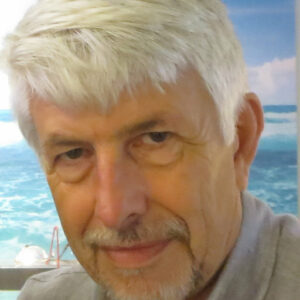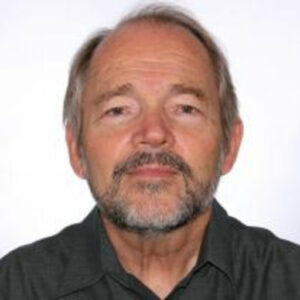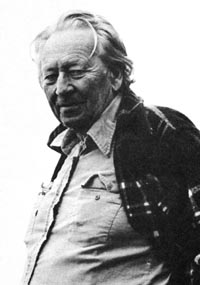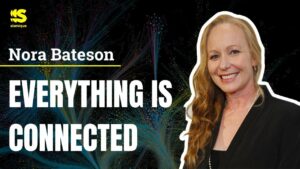Two environmental psychologists, Dr. Robert Gifford and Dr. Joseph Reser, on reasons why we don’t react to the threat of catastrophic climate change. Plus new film on Gregory Bateson, co-inventor of the “double bind” and eco-connection – by his daughter Nora.
Listen to or download this Radio Ecoshock show in CD Quality (57 MB) or Lo-Fi (14 MB)
DR. ROBERT GIFFORD – Why don’t we save ourselves?
At the time of this 2010 interview, Dr. Robert Gifford was a Professor of Psychology and Environmental Studies, at the University of Victoria, in British Columbia, Canada. He taught there since 1979. Gifford is a Fellow of both the Canadian and American Psychological Associations. He helped found the Pacific Institute for Climate Change Solutions, wrote more than 90 refereed science publications and many book chapters. He was an Editor of the Journal of Environmental Psychology.

Gifford asks the question: what goes on in the minds of humans when they think about climate change? More specifically, why do they fail to react, or outright deny it? When I did my research, Gifford found 13 main psychological barriers to dealing with climate change. For communication purposes, he calls them “Dragons”. Now he’s up to 29 different Dragons.
We discuss a couple of examples, like “Social Norms and Equity”. Apparently, people try to follow others that they admire. If those others are driving gas guzzlers and living in monster houses – we want to do that too.
Then there is “Reactance” – a rebellious unwillingness to be told what to do – even if that action could save the person suffering or even their lives.
You can find a quick list of the Gifford’s “dragons” behind climate denial in this transcript from the show.
DR. JOSEPH RESER – The personal experience of climate disruption
Dr. Joseph Reser is Adjunct Associate Professor in the School of Psychology at Griffith University, in Queensland, Australia. He has written extensively on environmental psychology, and has an eye for impacts in the tropics, and Asia.

I ask Dr. Reser about a report from the American Psychology Association on climate change. It’s good to see another professional health body working on this. Environmentalists might have to rethink some campaigns and approaches, once they read this report.
The APA report is called:
“Psychology and Global Climate Change: Addressing a multi-faceted phenomenon and set of challenges” – Report of the American Psychological Association Task Force on the Interface Between Psychology and Global Climate Change
Find the Executive Summary here.
Both our guests, Gifford and Reser, worked on this report. In 2020 Reser led this paper: “The nature, significance, and influence of perceived personal experience of climate change”.
GREGORY BATESON AND NORA BATESON
It was a real pleasure to talk with Nora Bateson about her film “An Ecology of Mind”. It is an intellectual history of her father, the famed social scientist Gregory Bateson.

Gregory Bateson was an innovator and founder in many fields. I learned of his ecological theories in the 1970’s, partly due to Stewart Brand, publisher of “The Whole Earth Catalog”. Bateson quotes inspired and mystified me, at the same time.
We start with a quick look at the many fields where Gregory Bateson was a co-inventor. He worked with his wife Margaret Meade in New Guinea, making thousands of photos and early films of life there. They were helping to create the field of “Anthropology” – the study of humans and their origins.
Bateson helped develop “Cybernetics” -“the interdisciplinary study of the structure of regulatory systems.” Gregory Bateson died of cancer in 1980, in a Zen institution in California.
Nora Bateson’s film “An Ecology of Mind” played at the Vancouver International Film Festival in 2010 and went on to other festivals. In this program I play clips of Gregory Bateson and from the film. Nora Bateson is an award-winning filmmaker, writer and educator, and President of the International Bateson Institute, based in Sweden.

ALEX NOTES FROM NOWHERE:
THE MOTHER AND FATHER OF AI
Bateson’s Cybernetics is a step toward computer intelligence. Meriam-Webster defines Cybernetics as “a science concerned especially with studies comparing automatic control systems (as that of the nervous system and brain and mechanical-electrical communication systems)”. You can see links to artificial intelligence.
Oxford University Press gets closer, defining Cybernetics as “Cybernetics is the study of principles governing goal-directed, self-regulating, information-processing systems (artificial and living). Originating in the 1940s, it helped shape the cognitive revolution in psychology and has provided insight into cognition and the control of behavior.”
If cybernetics is the mother of AI, the IBM punch card system was father. Masses of personal information, stretching to include over a million people, was already operating in the 1940’s. IBM installed punch card computers in Germany, including in the Death Camps. IBM staff kept supplying punch cards used to cull Jewish people and track them to their final destinations. And you think AI might go badly, with millions of times more data, power, and money?
THE GHOST OF GREGORY BATESON COMES BACK TO HAUNT US
Gregory Bateson was surely a genius in many fields. But like most in his generation, when total war arrived, he turned his talents into the “black arts” – using psychology and other knowledge – to divide the enemy (in this case Germany and Japan). Read this revealing Wikipedia entry on Bateson – which surely explains the psychological warfare aimed at Western democracies today:
“In the 1940s, he helped extend systems theory and cybernetics to the social and behavioral sciences. Although initially reluctant to join the intelligence services, Bateson served in the OSS during World War II along with dozens of other anthropologists. He was stationed in the same offices as Julia Child (then Julia McWilliams), Paul Cushing Child, and others. He spent much of the war designing ‘black propaganda’ radio broadcasts. He was deployed on covert operations in Burma and Thailand, and worked in China, India, and Ceylon as well. Bateson used his theory of Schismogenesis to help foster discord among enemy fighters. He was upset by his wartime experience and disagreed with his wife over whether science should be applied to social planning or used only to foster understanding rather than action.”
“Schismogenesis”
Gregory Bateson discovered it. You are living in it. Wiki says: “Schismogenesis is a term in anthropology that describes the formation of social divisions and differentiation. Literally meaning ’creation of division’”. Secret services and propaganda mills have whole teams devoted to sowing division as a way of weakening perceived enemies or competitors. Corporations use it, to break up unions or browbeat social critics. With the Internet and intelligent tools even individuals can direct automated attacks on meaning, institutions, religions, race – anything. We are awash in Schismogenesis.
Once upon a time, tiny desert Lake Elsinore in California was home to a hundred high-powered speed boats. They all raced in one direction around the lake. Powerful waves from the wake created choppy battling white-caps. Public information spaces like Facebook or TikTok are choppy seas of competing Schismogenitors, information fighters in a war for your mind. Be sure and wash off after use…
This program goes out free to non-profit radio stations. As the stations are always struggling to raise enough funds, they do not allow me to ask for donations. That leaves just this blog, and you dear reader, to help pay the bills to make and distribute Radio Ecoshock. If you can help, please do so here.
Thanks for listening to Radio Ecoshock. I am already at work creating new shows. Our new season starts September 11th. There is a whole world to catch up on.
Alex